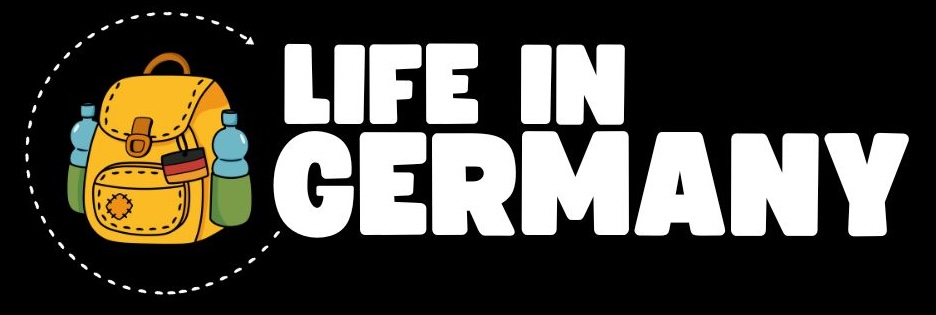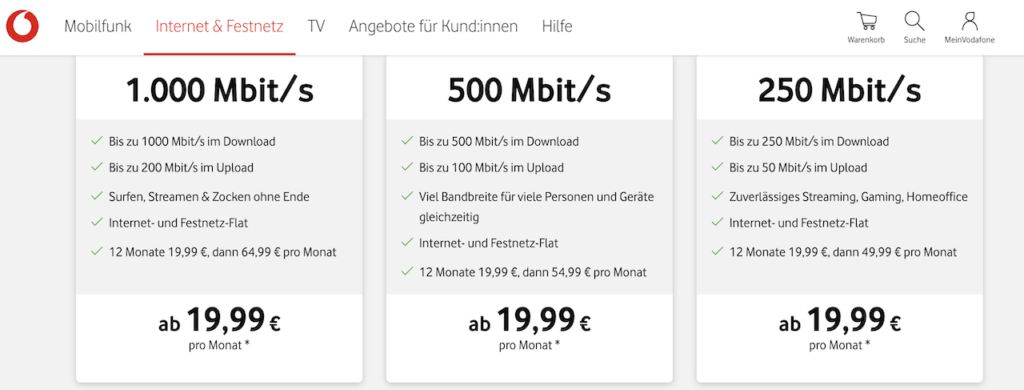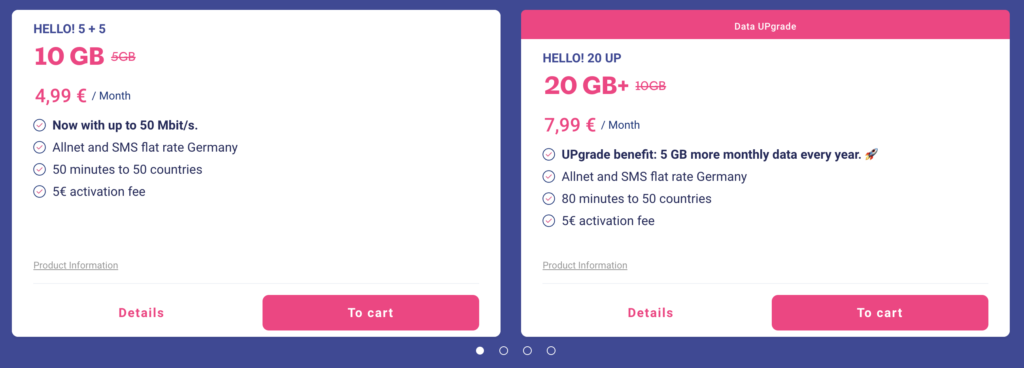How to Find the Best Internet Contract in Germany: Everything You Need to Know
Whether you’re staying in Germany for a short period or planning to settle in, finding a good internet contract is very important.
We go over this in detail in the Welcome Program (showing you how to compare prices on German sites to get the best deal and more). Still, you can also quickly read more to get answers to all the common questions about connecting to the internet in Germany, from choosing the right provider to avoiding common pitfalls so you can get the best deal possible.
What Are the Main Internet Service Providers (ISPs) in Germany?
Germany has a range of internet service providers, each offering different packages to suit various needs. Here are some of the leading ISPs:
- Deutsche Telekom: One of the largest providers, offering DSL, fiber-optic, and mobile internet. It’s known for its wide coverage and reliable service but is usually more expensive.
- Vodafone: Offers both DSL and cable internet. Vodafone is popular for its competitive pricing and good customer service.
- 1&1: Known for its flexible contracts and competitive pricing. They offer DSL, fiber-optic, and mobile internet services.
- o2: Offers DSL and mobile internet with no long-term contracts, making it a good choice for expats and temporary residents.
- Unitymedia (now part of Vodafone): Focuses on cable internet, primarily in the western regions of Germany.
Note: Not all internet providers may be available in your area, so make sure to input your address and zip code in the required boxes before looking at prices. Here’s an example ⬇️
For more detailed comparisons and links to these providers, check out Deutsche Telekom, Vodafone, and 1&1. For a more detailed description of which provider is best for English speakers, you can get more info on our sister site.
How Fast Is the Internet in Germany?
The speed of your internet in Germany largely depends on your location and the type of connection you choose:
- Urban Areas: Major cities like Berlin, Munich, and Frankfurt typically offer high-speed options, including fiber-optic connections with speeds up to 1 Gbps.
- Rural Areas: Speeds may be slower, often limited to DSL connections with speeds ranging from 16 Mbps to 50 Mbps.
TIP: To check the availability and speed of the internet at your address, you can use this tool by Deutsche Telekom.
What Types of Internet Connections Are Available?
In Germany, you have several options for connecting to the internet:
- DSL (Digital Subscriber Line): The most common type of connection, available almost everywhere. Speeds range from 16 Mbps to 250 Mbps.
- Cable Internet: Offers higher speeds than DSL, up to 1 Gbps. It’s available in many urban and suburban areas.
- Fiber-Optic (FTTH/B): The fastest option, but with limited availability. Speeds can reach up to 1 Gbps.
- Mobile Internet: Ideal for those on the go or without access to fixed-line services. Providers offer 4G LTE and expanding 5G networks.
Tip: Always check if fiber optic is available at your address, as it provides the best performance.
How Much Does Internet Service Cost in Germany?
Internet costs in Germany vary based on the provider, connection type, and speed. Here’s a general breakdown:
- DSL: €25 – €45 per month for speeds between 16 Mbps and 250 Mbps.
- Cable: €30 – €50 per month for speeds between 50 Mbps and 1 Gbps.
- Fiber-Optic: €40 – €60 per month, depending on the provider and speed.
- Mobile Internet: €15 – €30 per month for 5-10 GB of data, with higher prices for unlimited data plans.
Additional Costs:
- Installation Fees: These can range from €0 to €69.99, but some providers waive the fee if you sign up for a long-term contract.
- Router Rental: Usually €5 – €10 per month, though some providers offer free routers.
Visit Vodafone’s deals or 1&1’s offers to check out more package options.
How Do I Set Up Internet Service in Germany?
- Choose a Provider: Research and compare offers from the main ISPs.
- Check Availability: Use the provider’s online tools to check if your chosen service is available at your address.
- Sign a Contract: Contracts typically range from 12 to 24 months. Some providers offer flexible, month-to-month contracts but at a higher price.
- Schedule Installation: Once your contract is signed, an installation date will be set. A technician may visit to set up your connection, especially for new DSL or cable installations.
- Set Up Your Router: Once connected, you’ll receive your router, which can be self-installed using the provider’s instructions.
Important Tip: Make sure to read the fine print regarding contract termination conditions. Early termination often incurs penalties. For more information about setting up your Germany you can find a step-by-step process on our sister site.
Are There Any No-Contract or Short-Term Internet Options for Expats and Tourists?
- o2: Known for its no-contract DSL options, where you can cancel at any time with a one-month notice period.
- Congstar: Offers flexible prepaid options for both DSL and mobile internet, perfect for short-term residents.
- Hotspots and Mobile Data: Many cafes, hotels, and public spaces offer free Wi-Fi. For mobile data, consider getting a prepaid SIM card from providers like Aldi Talk or Lebara. Find out more about the best phone plans and contracts here.
Pro Tip: If you’re staying for less than a year, avoid signing long-term contracts to avoid early termination fees.
How Reliable Is the Internet in Germany?
Generally, internet reliability in Germany is good, but it can vary (at my house in Düsseldorf, it’s awful and sadly, there’s not much I can do to change that):
- Urban Areas: Consistent and reliable, with minimal downtime.
- Rural Areas: Some areas may experience slower speeds and occasional outages, particularly with DSL connections.
If you experience frequent outages, contact your provider’s customer service. Keep a record of issues to potentially negotiate compensation or terminate your contract without penalty.
What Are the Best Options for Mobile Internet in Germany?
Mobile internet is widely available in Germany and can be an excellent option for those needing flexibility:
- Prepaid SIM Cards: Providers like Lebara (which runs in English) or WinSim offer prepaid SIM cards with various data packages.
- Contracts: For more data and better network coverage, consider a mobile contract with providers like Deutsche Telekom, Vodafone, or o2.
- 5G Availability: 5G is rolling out across Germany, primarily in urban areas, offering faster mobile data speeds.
Example of Lebara Phone Plans in Germany
Is Public Wi-Fi Widely Available in Germany?
Public Wi-Fi is available but not as widespread as in some other countries. Here’s where you will often find public Wi-Fi ⬇️
- Cafes and Restaurants: Many offer free Wi-Fi, but you may need to ask for a password.
- Public Spaces: Cities like Berlin and Munich offer free Wi-Fi in certain public areas, including parks and squares.
- Trains and Stations: Deutsche Bahn offers free Wi-Fi on most ICE trains and at major train stations.
Security Tip: Always use a VPN when connecting to public Wi-Fi to protect your personal information. Using a VPN in Germany is legal and commonly done for added privacy and to access content restricted by region. Here are some great options ⬇️
- NordVPN: Offers robust security features and a large server network, making it a top choice for privacy and speed.
- IPVanish: Known for its fast connections and strong encryption, ideal for users who prioritize performance.
- PureVPN: Provides a wide range of global servers and versatile features, suitable for streaming and secure browsing.
- CyberGhost: Focuses on user-friendly interfaces and specialized servers for streaming and torrenting, ensuring privacy and ease of use.
What Is the Process for Canceling an Internet Contract in Germany?
Pay close attention to the terms when canceling an internet contract ⬇️
- Notice Period: Most contracts require a 3-month notice before the end of the contract period. If you don’t cancel in time, the contract often renews automatically.
- Early Termination: If you need to cancel early (e.g., due to moving abroad), you may face penalties. Some providers allow early termination if you move to a location where their service is not available.
- Return Equipment: You will need to return any rented equipment (like routers) to avoid additional charges.
Cancellation Tip: Always send your cancellation notice via registered mail (Einschreiben) to have proof of delivery. You can use aboalarm to help you put together and send the notice.
Tips for Avoiding Internet Scams and Unwanted Contracts
Unfortunately, some people in Germany have been scammed or pressured into signing unfavorable contracts (including myself, twice). Here’s how to protect yourself:
- Beware of Door-to-Door Salespeople: It’s common for representatives to come to your door selling “the latest” internet deals. Always ask for credentials, and never sign anything on the spot. Give yourself time to compare their offer with others.
- Read the Fine Print: Always review the full terms and conditions before signing a contract. Look for hidden fees or clauses that may affect your decision. Unfortunately, this is not uncommon in Germany!
*Prices are always subject to change
Digital Support
Explore my collection of practical, family-friendly digital resources – designed to support multicultural families in feeling confident, connected, and at home in Germany.

Free 12-Step Checklist

1-on-1 Video Call

Life in Germany Welcome Program

Life in Germany for Kids
Get Culturally Ready
I’ve spent the last 10 years collaborating with experts in various fields and perfecting the process for moving to Germany. However, that doesn’t mean my process was easy! I have so many stories to tell and tips to share.




